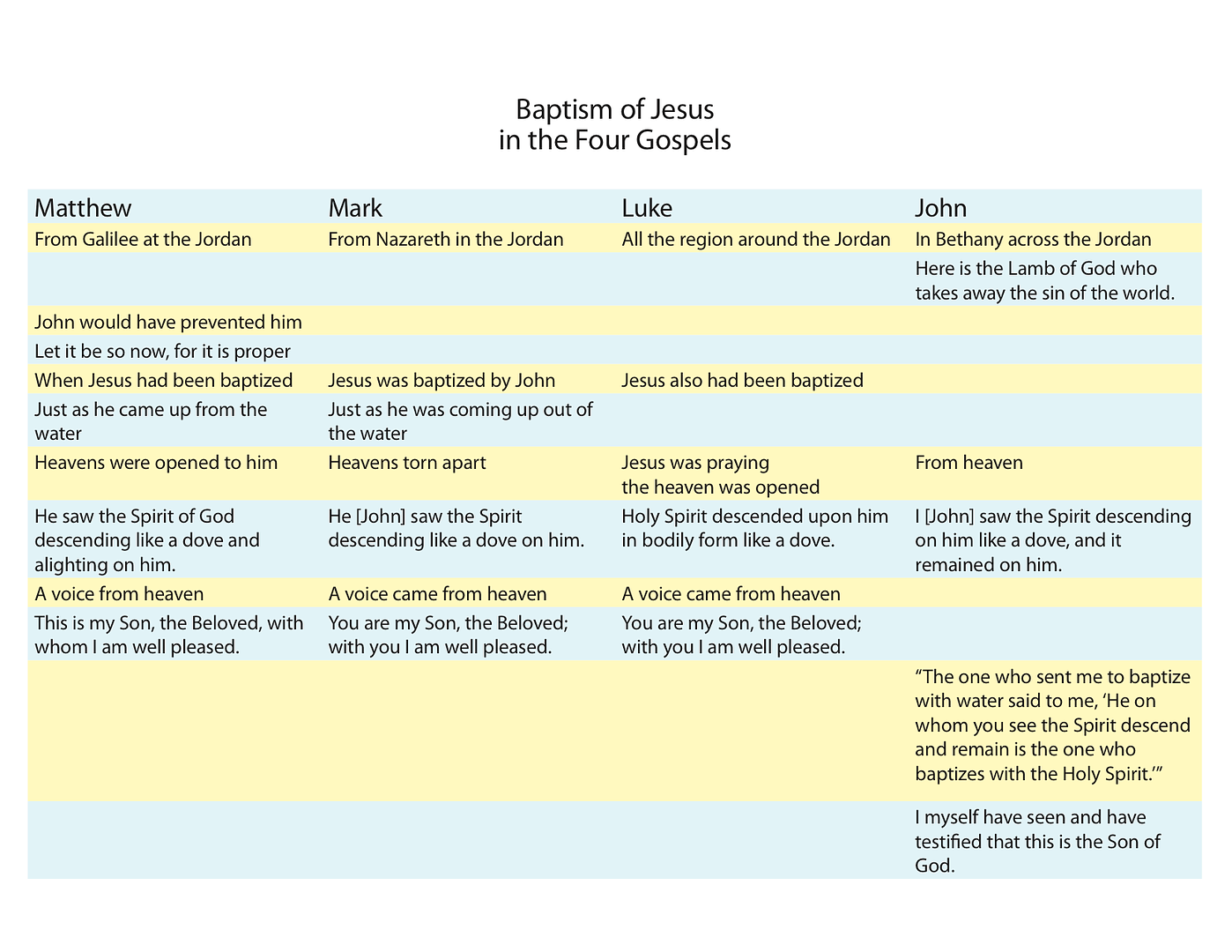Matthew 3:13-17
13Then Jesus came from Galilee to John at the Jordan, to be baptized by him. 14John would have prevented him, saying, "I need to be baptized by you, and do you come to me?" 15But Jesus answered him, "Let it be so now; for it is proper for us in this way to fulfill all righteousness." Then he consented. 16And when Jesus had been baptized, just as he came up from the water, suddenly the heavens were opened to him and he saw the Spirit of God descending like a dove and alighting on him. 17And a voice from heaven said, "This is my Son, the Beloved, with whom I am well pleased."

On the first Sunday of Advent, the church began a new year of grace; we've moved into the season of epiphany. Last week we discussed the "epi" (upon) and "phan" {revealing, revelation) roots of the word. The feast and the season of epiphany specifically brings us the revelation of Jesus as savior and lord for all the world. On the Day of Epiphany (or the nearest Sunday, as we observed last week on January 5th), we hear about the wise guys, star gazers, astrologers, Zoroastrians, ethnic and religious foreigners to Israel visiting Jesus, bringing gifts from the east. That event has become an icon of God's gracious universalism that in Jesus Christ redeems all people and all creation.
Today for Jesus' baptism by his cousin John the Baptist, we experience a trinitarian theophany, or revelation of the trinity with the voice of God the Father, the presence of Jesus God the Son, the familiar dove symbol or icon of God the Holy Spirit / Holy Ghost. For the meeting of heaven and earth at Jesus' baptism, Mark uses a word for a rip or tear that can't be mended. As Pastor Peg commented last year, the same word applies to the transfiguration and to the tearing of the temple veil at Jesus' crucifixion. With Jesus, all the earth, all creation, has access to God. Divisions between earth and heaven have been obliterated.
As you may have heard, the word and concept of Trinity is not in the bible, but scripture implies a Triune God—maybe especially in scenes like today's Baptism of Jesus and in the Transfiguration we'll celebrate to conclude the Epiphany season before Lent begins. Although Mark's gospel opens with "Jesus, Son of God," and toward the end the Roman centurion proclaims at Jesus' death "truly this was a Son of God," when the apostle Paul and when the gospels were written, people weren't pondering why the fully divine Jesus Christ would need to be baptized. Again, Jesus' baptism is theologically different from ours; today we'll only consider Jesus' baptism.
The Council of Nicaea that convened in the year 325 and gave us the Nicene Creed, the council of Chalcedon in 451 wrote the Definition of Chalcedon; both statements affirm Jesus' full humanity and complete divinity.
This visual chart relates to the class handout that includes baptism of Jesus texts from all four gospels. Synoptic gospels Matthew, Mark, and Luke describe Jesus being baptized (immersed or dunked); John's gospel strongly implies it. All four gospels tell us Jesus' cousin John was hanging out around the Jordan River. Especially from the Exodus out of slavery into the Promised Land, we know the Jordan as border and boundary between slavery in Egypt, exodus desert wanderings, and a new promise landed life of obedience, repentance, and grace in covenanted community. For Jesus, the Jordan was border and boundary between his more private life and his public life of obedience, grace, and keeping righteous covenant.
To me It's especially striking that people who probably had access to the Jerusalem Temple would venture down to the riverside to listen to John the crazy guy on the margins of polite society.
John the Baptist's baptism of repentance probably related to the entire nation of Israel as a new political, religious, and economic beginning. Contemporary twenty-first century Jews still have a practice of mikvah that's a cleansing bath or immersion. Jesus was not baptized a Christian! However, in these accounts of his baptism, God claimed and named Jesus as Son and as Beloved, just as God names and claims us in baptism as daughter, son, beloved; God also fills us with the Holy Spirit, just as the HS filled Jesus.
Hebrew scripture tells us Elijah will need to return before the Messiah arrives; next Sunday we'll look more closely at John the Baptist as the New Elijah, the link or hinge between the OT and NT; in several places, Jesus essentially announces "For me, John is Elijah." For his cousin Jesus, John the Baptist is very much Elijah the forerunner of the Messiah, end of the time of promise, start of the time of fulfillment. Next week in John's gospel we'll hear John the Baptist identifying Jesus as "the Lamb of God, who takes away the sins of the world."
No comments:
Post a Comment